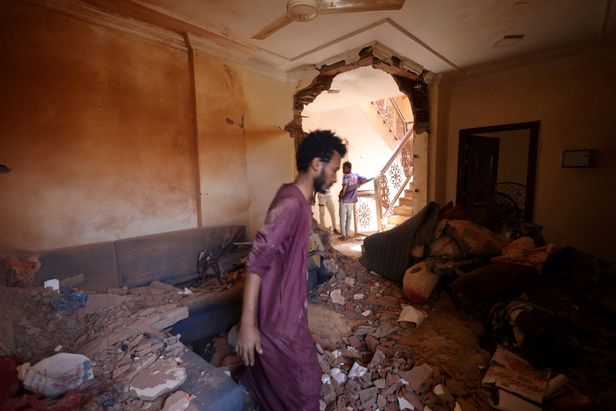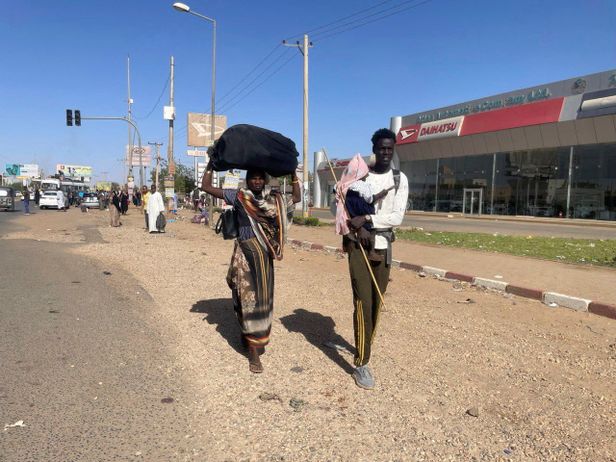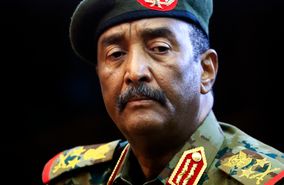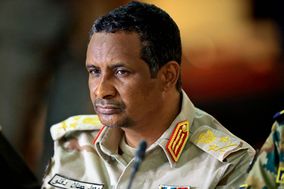www.aljazeerah.info
News, May 2023
Archives
Mission & Name
Conflict Terminology
Editorials
Gaza Holocaust
Gulf War
Isdood
Islam
News
News Photos
Opinion Editorials
US Foreign Policy (Dr. El-Najjar's Articles)
www.aljazeerah.info
|
Editorial Note: The following news reports are summaries from original sources. They may also include corrections of Arabic names and political terminology. Comments are in parentheses. |
The Battle of the Generals in Sudan: A Bloody Turn in Africa's Story of Hope
Der Spiegel, May 11, 2023
 |
 |
|
Sudanese civilians leaving Khartoum, April 2023 |
Sudanese civilians leaving Khartoom, April 2023 der spiegel |
 |
 |
| General Burhan | General Hemeti |
The Battle of the Generals: A Bloody Turn in Africa's Story of Hope
Two rival generals have sparked a war that has buried hopes for a peaceful and democratic fresh start in Sudan. The activists who once brought down the dictatorship are now fearing for the future – and for their lives.
By Heiner Hoffmann und Fritz Schaap in Nairobi, Kenya
Der Spiegel, 22.04.2023, 11.30
Uhr Artikel zum Hören, With additional reporting by Mohamed Al-Amin
A dull bang, first further away, then louder and louder. Shadin Alfadil is still in bed when she begins hearing the sounds early on Saturday morning. But she's already familiar with it from the demonstrations she has regularly been attending for more than four years now.
She has heard it immediately before fellow campaigners, friends, collapsed dead, their blood spilling out on the asphalt. She knows what gunshots sound like. And she knows all too well what they can do.
Alfadil, a young Sudanese woman with a serious face and a firm voice, reaches for her smartphone, with new messages constantly popping up on the screen. "Shots fired downtown." Or later: "Airstrikes in Khartoum." She related her story in a telephone interview with DER SPIEGEL.
It is, for now, the nadir in the history of a revolution that filled not just Sudan, but the whole world with hope. It has been four years since Alfadil first joined thousands of others on the streets of Khartoum in a death-defying act of protest. Starting in December 2018, the Sudanese wrote one of the most impressive chapters of the Arab democracy movements for their country - one which has been ravaged by massacres, famine and crises over the years. They managed to achieve what no one had believed possible: They protested until they drove dictator Omar al-Bashir from office. After 30 years of dictatorship, democracy suddenly seemed within reach. Sudan had become emblematic of what can be achieved through peaceful resistance.
Since then, though, hopes for democracy have been further and further destroyed by the country's powerful military. And now, those dreams could be buried for good in a hail of bombs.
Fighting in the Backyard
Alfadil has shifted into emergency gear. With the violence spreading, she checked her supplies of food and water on Monday. And quickly realized that she wasn't in good shape. It was still Ramadan, the Muslim month of fasting, during which many of the faithful eat only after sundown and with only scant supplies of food at home. "I try not to get too full so that the supplies will last for a while," she told DER SPIEGEL by phone on Monday. "We haven't had any running water since yesterday."
Alfadil speaks fluent English and works for an international organization. But none of that is of any help to her now. The fighting outside her door continues, and few in Khartoum dare to go outside. She says that one of her parents' neighbors was shot to death on Sunday.
Since the early hours of Saturday morning, Africa's third-largest country has been in a state of war. There is fighting in almost all parts of the country, with two rival generals and their armies facing off against each other. On one side is Sudan's regular armed forces, commanded by the de facto president, General Abdel Fattah al-Burhan. On the other is the paramilitary Rapid Support Forces (RSF), under the command of his deputy Lieutenant General Mohamed Hamdan Daglo, known as Hemeti. Hemeti's forces are estimated to include around 100,000 fighters.
A Failed Transition of Power
It is a power struggle between two men, a civil war without civilians, being waged entirely by the military - but with heavy weapons, artillery and fighter jets. By Thursday, hundreds of people had already died, and thousands were injured. The Khartoum airport has been badly damaged and there are no more scheduled flights. Fighter jets circle overhead and shells are exploding in the middle of residential areas. Those who can have been fleeing the city, and the rest, like Shadin Alfadil, have entrenched themselves in their apartments and basements.
It was supposed to be a month of hope. An agreement had been signed back in December according to which Burhan and Hemeti agreed to hand over power to a civilian-led government. It was supposed to have happened on April 11.
ANZEIGE
It could have been a new attempt to finally complete the revolution. That, at least, is what people like Alfadil had hoped.
For that to happen, though, the two men would have had to reach agreement on how to combine their two forces, a step that is a key part of the agreement. Burhan wanted to integrate the RSF into the regular army within two years. But Hemeti had insisted on a 10-year transition period. The question of what the future command structure should look like also produced irreconcilable differences, as did the prospect that they could eventually be tried for crimes themselves. Out of fear of losing their own influence, the generals turned on each other.
Pressure from Abroad
It's hard to say who has the upper hand in the fighting. Sudan expert Alex de Waal, director of the World Peace Foundation at Tufts University near Boston, sees the army as having an advantage, at least in the short term. But therein lies another danger. "I think they will try to press their advantage and keep fighting, and the window of opportunity for negotiations will pass," he says. But winning, de Waal is certain, is something the army cannot do, at least not across the entire country.
He argues that Egypt, Saudi Arabia and the United Arab Emirates, countries that wield a fair amount of influence in Sudan, need to quickly move to exert pressure. "With every day that passes without them (the regional powers) getting their act together, the dangers escalate because the conflict becomes more complex. And then it will become a long and complicated, multi-sided civil war."
Shadin Alfadil huddled in her apartment over the ensuing days as shots continued to be fired outside and artillery and fighter jets turned buildings into rubble. The life story she has to tell is one that is closely tied to her country's recent history. In telephone conversations, she spoke about her hopes for change, the myriad setbacks and her firm conviction to never give up.
A Victorious Revolution
Alfadil was there in December 2018, in her early 30s at the time, when thousands took to the streets to protest against Bashir. She didn't want to spend her whole life in an authoritarian country with rigid moral norms, oppressed by a violent leader. "We wanted to fight for freedom," she says. The protests went on for four months. Finally, on April 11, 2019, jubilation broke out and activists embraced each other on the streets when the military turned on Bashir and arrested him. "That was a moment of hope," Alfadil says. "I believed in a better Sudan." But the euphoria didn't last long. The military showed no interest in relinquishing power.
Two generals are now determining the country's fate: Burhan and Hemeti. But the power struggle currently plunging the country into chaos began taking shape behind the scenes quite some time ago. Many observers already saw Hemeti as the country's true strongman back in 2019.
His career as a brutal commander began in 2003, during the rebellion in Darfur, which saw African-descended groups there rise up against the Arab-dominated government in Khartoum. Dictator Bashir mobilized Arab youth to put down the uprising, which led to the emergence of the notorious Janjaweed militias. Hemeti became one of their most important commanders.
During the first, particularly brutal, years of the war in Darfur, several hundred thousand civilians were killed and more than 2 million people displaced. Hemeti's Janjaweed rode into villages, slaughtered the inhabitants, raped the women, robbed and looted. The International Criminal Court later issued an arrest warrant against Bashir in connection with these crimes, including genocide.
Looting, Murders and Mass Rapes
Hemeti acted brutally, but more than anything else, loyally. Bashir thus put him in charge of the newly established Rapid Support Forces (RSF) in 2013, and Hemeti took many of his old fighters with him to the new unit. The RSF went on to commit looting, murder and mass rape in a number of regions in the country. Bashir had created an uncontrollable monster.
The dictator transformed the troops into a kind of bodyguard to protect him from protests – even more importantly, though, from coup attempts by the army. Alongside the army and the intelligence service, the RSF became a third power within the Sudanese security apparatus. When revolution swept the country in 2018, Hemeti used it to his advantage, abandoning his loyalty to the dictator and baking his ouster.
When the protests continued even after Bashir's overthrow, Burhan and Hemeti finally agreed to a compromise and created a transitional council. They promised change, but activist Alfadil and her fellow campaigners didn't trust them. The protesters once again took to the streets. Hemeti quickly showed his true face. On June 3, 2019, RSF units burned down protesters' tents, shot indiscriminately into the crowd and beat up participants. More than 100 people died, with many bodies simply being thrown into the Nile River. "I was also attacked," Alfadil says. "But we didn't give up. We had to prevail with the revolution."
After months of negotiations, a council was again formed, this time called the Sovereign Council, staffed half by civilians and half by the military. Free elections were to finally to be held at the end of this transition.
A State within the State
From the beginning, though, the military part of the newly created transitional government showed little interest in actually pursuing reform: The generals were afraid of losing their power – and their access to money. Because in Sudan, the army is basically a state within the state: High-ranking military officers are often firmly established in the business world and they rake in huge amounts of money thanks to widespread corruption. Among his business interests, for example, Hemeti works together with mercenaries of Russia's Wagner Group at his gold mines.
What followed were ups and downs, a tug-of-war for power, until, on October 25, 2021, the army and the RSF staged another coup and dissolved the interim government. They were still working side by side at the time.
The old familiar pattern quickly reestablished itself: Shadin Alfadil and her fellow campaigners took to the streets, and again people died. In the end, the generals again promised a transition to civilian rule.
But in the first months of this year, tensions between the two men increased. Hemeti sought to present himself as a true supporter of democracy and the possible next leader of Sudan and forged an alliance with a coalition of civilian political parties. But Burhan apparently feared Hemeti's growing power. When the RSF moved more units into Khartoum last week, it was apparently one provocation too many.
A Humanitarian Disaster
On Tuesday, the fourth day of the war, the situation for Shadin Alfadil grew increasingly fraught. She lives alone, and her concerns began mounting. What do I do if I get caught up in it? If a bullet hits me? How long will it take before someone finds me? The power went out for hours. It was becoming increasingly clear that a humanitarian catastrophe was developing. The World Food Program has suspended its operations after three of its staff members were killed. Looting took place at the warehouses of other humanitarian organizations. Even before the conflict, more than a third of the population had been dependent on aid.
On Tuesday evening, even though a time had been agreed for DER SPIEGEL to speak to her by phone, Alfadil could no longer be reached. A cease-fire was supposedly in place to enable people to flee or obtain basic necessities, but the fighting continued unabated, and in some parts of the city, it is growing even fiercer.
Eyewitnesses have shared accounts of bodies in the streets that haven't been recovered for days, of the stench of decay, of looting RSF units.
Holding Doctors Against Their Will
Various medical organizations have reported that most hospitals are no longer in operation and that the health-care system in Khartoum is on the verge of collapse.
Some hospitals have been bombed, reports doctor Sara Mohamed, while others lack medical staff. In addition, the doctors' committee made a serious mistake, publishing the names of hospitals that were still in operation. "Shortly after that, the RSF deployed and occupied them because they didn't know how else to take care of their wounded," Mohamed says. She says a doctor friend had just managed to escape, but others were still being held.
The situation is terrible, she says. "There are no words for it. I don't know if I will ever see my family again."
On Wednesday morning, activist Alfadil finally wrote a message, apologizing for her silence. She says she sufferred a mental breakdown. Two hours later, we held a phone call, but it lasted only two minutes and 20 seconds. Her voice sounded different than it had in the previous days - filled with fear. "I can only stay on for a second," she says, "we have to escape." She said a projectile had landed in her yard and exploded, instantly killing the gardener, the guard and one of her friends. "It's so random, there are no targets here," Alfadil says.
Fleeing Khartoum
She takes her sister and her sister's mother-in-law with her, and they drove two hours south, out of Khartoum, through the fighting. But as they guided themselves to safety, fearing for their lives, other activists were already beginning to organize again. They created WhatsApp groups where people needing help can put in requests, and help is then organized for them.
Videos are circulating on Facebook showing activists spray-painting walls with antiwar graffiti. Fighting can be heard in the background. Men singing songs against military rule. The civilian resistance is back in action. Shadin Alfadil is certain: She, too, will join the protests on the streets again. "Whoever wins this war threatens to become Sudan's new dictator," she says. "And one thing is clear to us: We will never accept a dictator again. Never!"
But experts are critical. Alan Boswell, responsible for the Horn of Africa at the International Crisis Group think tank, says: "It's the absolute nightmare scenario for the transition to democracy." Boswell says the intention of the two sides at the moment is clear: "They want to resolve the conflict militarily." But Boswell believes it is highly unlikely that either side can win the war.
It seems just as unlikely, though, that they will be able to find a compromise. The two sides are also fighting each other in the crisis-ridden region of Darfur. Experts are closely watching the escalation there with great concern. "Darfur is going to become a world of hurt. We'll probably see huge devastation and really scary amounts of potential carnage there, which is where Hemeti's stronghold is," Boswell says. The potential for terrible bloodshed, he adds, is high.
Alfadil finally arrived in the southern part of the country on Wednesday night after making her way by car through the fighting. On Thursday morning, she sent two short messages on WhatsApp: "super exhausted," followed by, "It's very safe here." No shots and no bombs. It's a calm that should be prevailing across the country following agreement on a third cease-fire, but in Khartoum, it hasn't held once again. Alfadil is tired. She has no idea what to do next. She does know one thing, though: Giving up isn't an option.
Sudan: A Bloody Turn in Africa's Story of Hope - DER SPIEGEL
***
Fair Use Notice
This site contains copyrighted material the
use of which has not always been specifically authorized by the copyright
owner. We are making such material available in our efforts to advance
understanding of environmental, political, human rights, economic,
democracy, scientific, and social justice issues, etc. We believe this
constitutes a 'fair use' of any such copyrighted material as provided for
in section 107 of the US Copyright Law. In accordance with Title 17 U.S.C.
Section 107, the material on this site is
distributed without profit to those
who have expressed a prior interest in receiving the included information
for research and educational purposes. For more information go to: http://www.law.cornell.edu/uscode/17/107.shtml.
If you wish to use copyrighted material from this site for purposes of
your own that go beyond 'fair use', you must obtain permission from the
copyright owner.
|
|
|
|
||
|
||||||


